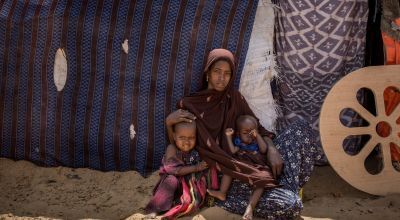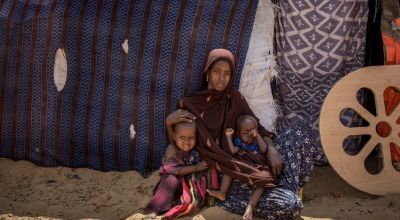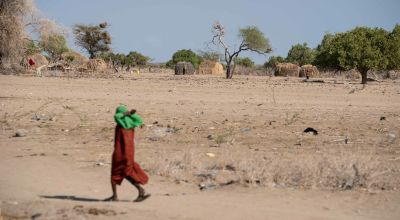
Read our 2023 annual report

Knowledge Hub
There’s a growing sense of hopeless among people I meet through my work, as I travel from community to community in drought-stricken, rural northern Kenya.
You can feel it. And when you talk to people, hear their stories and see the hardship they are experiencing, it’s very hard not to be moved emotionally.
I visited a woman recently in her hut. One of her children had been admitted to hospital, suffering with malnutrition. Her herd of 100 cattle had died from hunger and disease. She was lying with a bowl of flour. That was all she had to feed the eight members of her family that day.
She had not eaten herself that day. She was depressed, detached from reality and in shock. “We try to eat every day but if we do not have any food, we sleep,” she told me.
As we were leaving, she added: “The next time you come here, instead of seeing carcasses of animals, you will see the remains of human beings.”
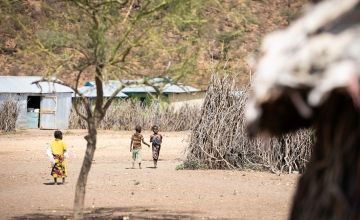
Her story is replicated across the vast rocky, sandy landscape of Marsabit in north western Kenya, criss-crossed with dried up seasonal river beds and large swathes of parched, cracked earth. The last four rainy seasons have failed and the current rains due in the coming weeks are also expected to fail. Without sufficient water, the future of communities is uncertain.
It has only rained once since I began working with Concern in Marsabit last November. The January rain only lasted a few days. It was temporary and sporadic — insufficient to replenish water supplies or regenerate pasturelands for livestock. However, the sporadic rain and sudden cold resulted in the death of many severely malnourished animals from shock and pneumonia/hypothermia. Over half a million cattle, goats, camel and donkeys died.
For these pastoralist people, their animals are their primary source of food and income. Without rain, there is no pasture or water for the animals. As we travel from village to village for nutrition and health outreach clinics, we see the skeletal remains of camels, goats, sheep and cows. Milk production and consumption by the children and pregnant women is almost nil, further exacerbating malnutrition.
Officially, the National Drought Management Authority, Marsabit County, reported that between July and September, there were almost 40,000 livestock deaths, attributed mainly to starvation, opportunistic diseases and parasite infestation.
Some families are barely feeding their children and adults are skipping meals
The loss of millions of livestock is taking a heavy toll on the mental health of population. Pastoralists are proud of their animals. When men lose their animals, it’s like many lose their manhood. They feel useless, unable to provide for their families. You can see the mental toll on their faces.
Equally as disturbing are the very alarming coping mechanisms which people are adopting in response to the loss of the animals and the growing uncertainty about where their next meal is coming from. Some families are barely feeding their children and adults are skipping meals.
As livestock die, human health soon suffers also. A major survey conducted in July revealed a worsening nutrition situation in North Horr and Laisamis Sub-County in Marsabit County, with Global Acute Malnutrition rates increasing from 20.80% to 30.30% in Laisamis and 22.60% to 29.50% in North Horr Sub-County over the last year. Normally malnutrition rates in this area are below 15%. Anything above 15% is considered critical.
With the worsening situation, my team are currently carrying out an exhaustive county-wide mass screening of children to try and get an accurate picture of the scale of the crisis. As part of this exercise, we are aiming to visit every family in the county, especially those who have moved far away in search of pasture and water for their livestock.
Families are on the move, driven by desperation. We have no option but to also follow them to ensure that we reach them with integrated health and nutrition services, no matter what. Others are moving to areas where they know assistance is being provided by organisations like Concern Worldwide or the government. This large scale movement makes our mass screening more challenging.
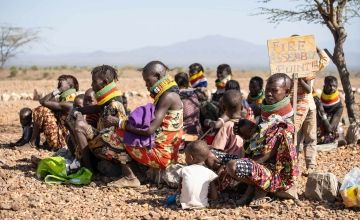
I recently attended the County Steering Group meeting, to discuss the scale of the ongoing drought. Marsabit County borders Ethiopia and we just received news that around 400 households that had migrated to the neighbouring country in search of pasture have come back having lost their livestock. This puts much more pressure on the constrained resources.
As people are becoming weaker it becomes more difficult for them to travel for help. Concern’s health and nutrition teams are responding by increasing the number of outreach clinics we are operating. This enables us to provide integrated health and nutrition services as well as nutrition treatment to those in need and identify those who need greater health supports.
Many of the villages where families have gathered do not have any medical facilities In some cases, our outreach clinics are run from under a shady tree. We are currently operating 81 bi-weekly outreaches out of 220 identified outreach sites. We are striving to reach 100% coverage.
Water is crucial for these communities. Concern is supporting access to adequate and safe water through water trucking and repairing non-functioning boreholes, which were either broken or dried up due to failures of rains. Where possible, Concern is installing solar-powered pumps at boreholes to make water available for people and livestock.
In communities where water is scarce, hygiene is important to prevent the spread of disease. Our teams are working to promote good hygiene practice (such as hand washing) and distributing items such as jerry cans, soap, menstrual hygiene kits and detergent in communities.
The months ahead are very challenging. The current rains due between now and December are forecast to fail. The early predictions for the March rains are also indicating that they will be below average. I was part of the team that was responding to the 2017 drought situation but the present one is the worst and the future looks grim. If the ongoing humanitarian response is not scaled up and sustained, the situation will get worse.
When you talk to people, they tell you there is no hope, that their future is in the hands of God. But many believe that if the rains do not fall in the coming weeks, then they will die.
Faith Atyang is the health and nutrition manager for Concern Worldwide in Marsabit, north western Kenya.



